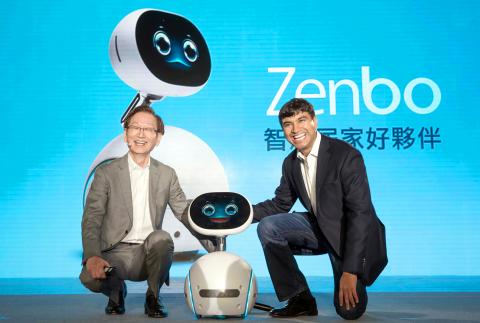PC maker Asustek Computer Inc (華碩) yesterday said its first voice-controlled robot, Zenbo, would be available for preorder in the consumer market on Jan. 1, meeting the company’s milestone to officially introduce the product.
The announcement came more than six months after Asustek chairman Jonney Shih (施崇棠) unveiled the robot at a news conference ahead of Computex Taipei in May.
However, Zenbo’s release date is slightly later than Shih’s promise to shareholders in June to introduce it to the market before Christmas, in a bid to contribute growth momentum to the company’s operations in the second half of the year.

Photo: Cho Yi-chun, Taipei Times
“It took time to ensure that Zenbo is ready to be a home companion for Taiwanese consumers,” Asustek spokesman Nick Wu (吳長榮) told reporters after the product’s launch event.
Asustek continues to invite software and hardware developers to enrich content for Zenbo, he added.
The first batch of 168 Zenbos is to be available for preorder via Asustek’s Web site, priced between NT$19,900 and NT$24,900, Wu said, but added that a shipment date has not yet been confirmed.
Zenbo, which is powered by Intel Corp’s RealSense human-computer interaction technology, is to initially be focused on providing education and entertainment content, as well as home security functions, Wu said.
Asustek has inked an agreement with Benesse Corp to develop interactive educational games based on the Japanese company’s famous cartoon character Shimajiro, due to the character’s high popularity among children in Taiwan, he said.
Collaboration with the National Police Agency allows Zenbo to report to police via videoconferencing if there is an emergency situation in a home, Wu said, adding that Zenbo can also help users reserve rides through Taiwan Taxi Corp (台灣大車隊) and connect to PChome Online Inc’s (網路家庭) Web site for shopping.
Asked if the company still plans to launch Zenbo in China next quarter and in the US in the second quarter of next year, Wu said Asustek plans to focus on its home market and would expand the robot’s sales when the firm is ready.
The sales contribution from Zenbo to Asustek will be limited at launch in Taiwan, but is expected to gradually increase as the firm begins mass production of the robot in the first half of next year, Wu said.
Asustek shares yesterday remained unchanged at NT$263.5 in Taipei trading, while the TAIEX dropped 0.41 percent.

Semiconductor shares in China surged yesterday after Reuters reported the US had ordered chipmaking giant Taiwan Semiconductor Manufacturing Co (TSMC, 台積電) to halt shipments of advanced chips to Chinese customers, which investors believe could accelerate Beijing’s self-reliance efforts. TSMC yesterday started to suspend shipments of certain sophisticated chips to some Chinese clients after receiving a letter from the US Department of Commerce imposing export restrictions on those products, Reuters reported on Sunday, citing an unnamed source. The US imposed export restrictions on TSMC’s 7-nanometer or more advanced designs, Reuters reported. Investors figured that would encourage authorities to support China’s industry and bought shares

FLEXIBLE: Taiwan can develop its own ground station equipment, and has highly competitive manufacturers and suppliers with diversified production, the MOEA said The Ministry of Economic Affairs (MOEA) yesterday disputed reports that suppliers to US-based Space Exploration Technologies Corp (SpaceX) had been asked to move production out of Taiwan. Reuters had reported on Tuesday last week that Elon Musk-owned SpaceX had asked their manufacturers to produce outside of Taiwan given geopolitical risks and that at least one Taiwanese supplier had been pushed to relocate production to Vietnam. SpaceX’s requests place a renewed focus on the contentious relationship Musk has had with Taiwan, especially after he said last year that Taiwan is an “integral part” of China, sparking sharp criticism from Taiwanese authorities. The ministry said

CHANGING JAPAN: Nvidia-powered AI services over cellular networks ‘will result in an artificial intelligence grid that runs across Japan,’ Nvidia’s Jensen Huang said Softbank Group Corp would be the first to build a supercomputer with chips using Nvidia Corp’s new Blackwell design, a demonstration of the Japanese company’s ambitions to catch up on artificial intelligence (AI). The group’s telecom unit, Softbank Corp, plans to build Japan’s most powerful AI supercomputer to support local services, it said. That computer would be based on Nvidia’s DGX B200 product, which combines computer processors with so-called AI accelerator chips. A follow-up effort will feature Grace Blackwell, a more advanced version, the company said. The announcement indicates that Softbank Group, which until early 2019 owned 4.9 percent of Nvidia, has secured a

CARBON REDUCTION: ‘As a global leader in semiconductor manufacturing, we recognize our mission in environmental protection,’ TSMC executive Y.P. Chyn said Taiwan Semiconductor Manufacturing Co (TSMC, 台積電), the world’s biggest contract chipmaker, yesterday launched its first zero-waste center in Taichung to repurpose major manufacturing waste, which translates into savings of NT$1.5 billion (US$46 million) in environmental costs a year. The environmental cost savings include a carbon reduction benefit of 40,000 tonnes, equivalent to the carbon offset of over 110 Daan Forest Parks, the chipmaker said. The Taichung Zero Waste Manufacturing Center is part of the chipmaker’s greater efforts to reach its net zero emissions goal in 2050, aligning with the UN’s 12th Sustainable Development Goal. The center could reduce TSMC’s outsourced waste processing